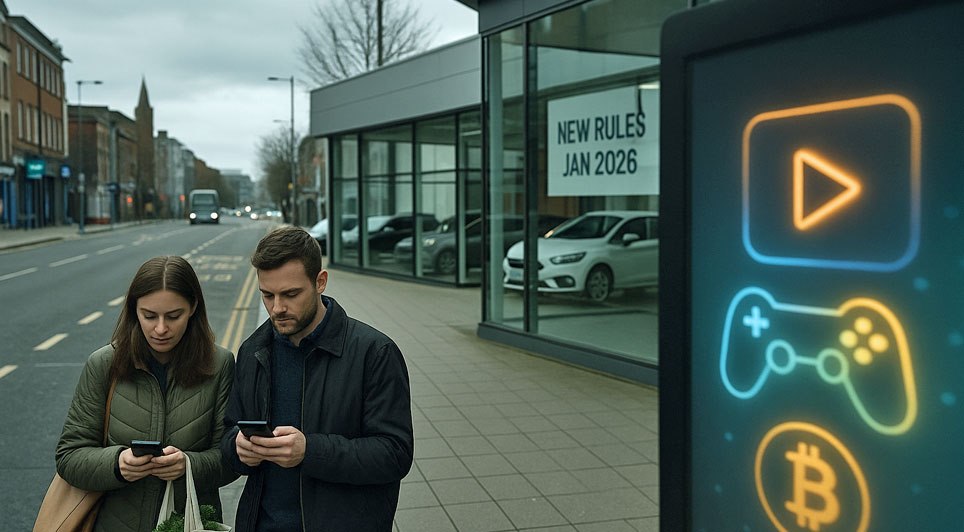Post-Brexit rules are beginning to influence daily life in practical ways, with Northern Ireland among the first places where these effects are becoming visible. New trade arrangements, cost pressures, and regulatory divergence are gradually shaping how people move, spend, and adapt – not only in business, but at the level of everyday routines.
In Belfast and other urban centres, some households are cutting back on travel and delaying major purchases. Others are adjusting their habits more quietly, turning to home-based services and digital entertainment, including a desire to find the best British crypto casino, which offers uninterrupted access without the limits of physical location or schedules.
These behavioural changes now coincide with policy updates that will soon affect how new vehicles are bought and registered in Northern Ireland.
New Car Rules Highlight Deepening Divergence
From January 2026, new vehicles approved only for the Great Britain market will no longer be eligible for registration in Northern Ireland. Instead, all new cars sold there must carry EU type approval – a requirement that does not apply in England, Scotland, or Wales. Plug-in hybrids will be particularly affected, as they must meet separate emissions standards, potentially leading to higher road tax for buyers in Northern Ireland. The changes will not apply to used vehicles.
Dealership executives have raised concerns about the long-term effects. Dave Sheeran of Donnelly Group called the development “an unintended pain of Brexit,” warning that Northern Ireland buyers will face a “restricted offering, restricted price list and potentially higher taxation.” Jeff McCartney of Charles Hurst added that while customers may still travel to Great Britain to buy a vehicle, Northern Ireland dealers will lose the ability to source those models locally.
Dealers Raise Economic Alarm Over Local Impact
Dealership groups appearing before Stormont’s economy committee described the rules as disruptive not only to sales but to employment. Northern Ireland’s franchised dealer sector employs approximately 17,500 people. Representatives from Agnew, Charles Hurst, and Donnelly Group urged MLAs to press for access to GB-approved stock beyond 2025, warning of serious pressure on revenue and jobs.
As NI car buyers face a tax hike, Sue Robinson of the National Franchised Dealers Association warned that restricted access to GB vehicle stock could have “very, very significant” consequences for Northern Ireland’s car market and employment base.
Budgets Under Strain as Regional Gaps Widen

The changing availability of goods is arriving at times of persistent budget pressure. According to the Family Spending in the UK report for April 2022 to March 2023, UK households spent an average of £567.70 per week, with transport accounting for 14% of total expenditure, making it the second-largest spending category after housing and energy.
Food and non-alcoholic drinks also made up 11% of weekly spending, which matches pre-pandemic levels. These figures provide context for how rising essential costs reduce financial room for other purchases. For many households in Northern Ireland, the combined pressure of changing rules and rising living expenses narrows the range of viable choices in both transportation and everyday spending.
Daily Life Moves in Quiet Response
This reduction in practical choices is starting to influence how people organise their time, particularly as certain goods and services become less accessible or more expensive. Namely, according to the Ofcom Online Nation Report, UK adults spent an average of 4 hours 20 minutes per day online in May 2024, with Northern Ireland residents averaging about 4 hours 16 minutes. These figures point to a growing role of digital leisure, particularly among the youn,g as the same report confirms that those aged 18–24 spent the most time online: an average of 6 hours and 1 minute per day.
This trend reflects more than entertainment habits. As travel becomes less practical and incomes more tightly managed, online platforms – including video, gaming, and cryptocurrency-based services – are taking on a more regular role in day-to-day life. The increase spans all age groups, though usage is highest among younger adults, according to national data.
Call for Certainty as Rules Redefine Normal
While these changes are visible in how people spend their time, they are also connected to how little many households have left to spend at all. Dealers are not the only ones asking for clarity. The broader public is adjusting its expectations in response to what now appears to be a long-term recalibration. According to the Northern Ireland Expenditure Tracker, for 2024 Q4, the lowest-earning households had only £52.80 per week of discretionary income after covering basic spending, with transport and food alone consuming 11.3% and 23% of their basic budgets, respectively.
For households already managing limited options, rules that further restrict supply, or increase cost, as in the case of potentially higher road tax, land with measurable force. As the region adapts to Brexit’s second phase, calls for stable, predictable regulation are growing louder, not just from businesses but from consumers who now face fewer choices across nearly every category of daily life.